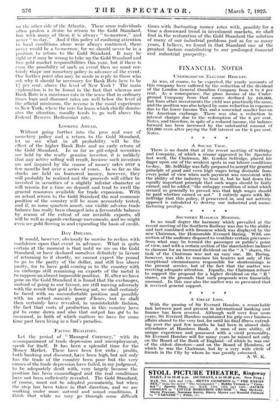• FINANCIAL NOTES
• UNDERGROUND ELECTRIC RESULTS.
As was, of course, to be expected, the' yearly accounts of this company have suffered by the reduction of the dividend of the London General Omnibus Company from 9 to 6 per cent. As a consequence, the gross income of the Under- ground Company from that source declined by £48,000, but from other investments the yield was practically the same, and the position was also helped by some reduction in expenses due to the lower Income Tax and a somewhat smaller loss on the American exchange. There was also a reduction in interest charges due to the redemption of the 6 per cent. Notes, and therefore, in spite of a reduced income, the balance forward has been increased by the substantial amount of £31,000 even after paying the full interest on the 6 per cent. Notes.
A SOUND VIEW.
There is no doubt that at the recent meeting of Selfridge and Company, of which a résumé appeared in the Spectator last week, the Chairman, Mr. Gordon Selfridge, placed his finger upon one of the weakest spots in our labour conditions to-day. Mr. Selfridge was fully prepared to accept the general principle of good and even high wages being desirable from every point of view when such payment was consistent with the ability of the industry to bear it, but he laid down the equally important principle that such wages should be fairly earned, and he added, "the unhappy condition of mind which seemed so generally to prevail was that high wages should be paid whether earned or not." I entirely agree with Mr: Selfridge that this policy, if persevered in, and not actively opposed is calculated to destroy our industrial and manu- facturing prestige.
* * * *
SOUTHERN RAILWAY MEETING.
In no small degree the harmony which prevailed at the recent meeting of the Southern Railway was due to the ability and tact combined with firmness which was displayed by .the new Chairman, the Honourable Everard Baring. With one section of the audience disposed to ventilate certain grievances from what may be termed the passenger or public's point of view, and with a certain section of the shareholders inclined to clamour for an increased dividend on the " A " shares, the task of the Chairman was not an easy one. Mr. Baring, however, was able to convince his hearers not only of the exceptional circumstances responsible for shortcomings in the present service, but of the fact that the matter was receiving adequate attention. Equally, the Chairman refused to support the proposal for a higher dividend on the B " shares, on the grounds that such proposals were financially unsound. In this case also the matter was so presented that it received general support.
* * * A GREAT Loss.
With the passing of Sir Everard Hambro, a remarkable link between past and present in international banking and finance has been severed. Although well over four score years, Sir Everard Hambro maintained his grip over business affairs almost to the very last, for until his final illness extend- ing over the past few months he had been in almost daily attendance at Hambros Bank. A man of rare ability, of unique experience and possessed with a vivid personality, Sir Everard Hambro will for many years be missed not only on the Board of the Bank of England—of which he was one of the oldest directors—and on the Board of Hambros, of which he was the Chairman, but by a very wide circle of friends in the City by whom he was greatly esteemed.
A. W. K.


























































 Previous page
Previous page